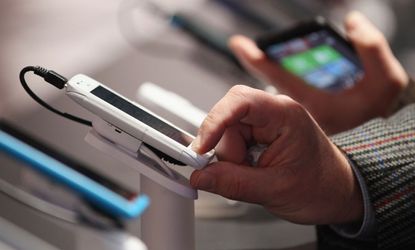Why mobile will be even more revolutionary than you think
The computer in your pocket will change everything


A few years ago, famed venture capitalist Marc Andreessen published a seminal article titled "Why software is eating the world." The main thesis was that not only was the software industry primed for continuing growth (this was at a time of bubble hysteria), but that the growth of software was no longer just about the software industry itself, but rather about software transforming other industries.
Thus far, the impact of software on business has been about the software industry itself (including the internet), or about software allowing other industries to do basically the same thing, except more efficiently. But now software is reshaping other industries. For example, Uber and self-driving cars are not just making existing transportation systems more efficient, but fundamentally reshaping them. Airbnb is not just about making it easier to book a hotel room, but changing what "hotel" means. As Andreessen pointed out, Disney — Disney! — had to buy a software company, Pixar, in order to remain relevant in the animated movie business.
Now Ben Evans, an analyst at Andreessen's imaginatively named firm Andreessen Horowitz, has produced a presentation specifically on mobile. Its title? "Mobile is eating the world."
Subscribe to The Week
Escape your echo chamber. Get the facts behind the news, plus analysis from multiple perspectives.

Sign up for The Week's Free Newsletters
From our morning news briefing to a weekly Good News Newsletter, get the best of The Week delivered directly to your inbox.
From our morning news briefing to a weekly Good News Newsletter, get the best of The Week delivered directly to your inbox.
Mobile devices are a transformative force, Evans argues. It's not just that there are more devices now than there ever were. It's also that these devices are fundamentally personal, and that means that the technology industry is involved in every aspect of our lives. And these devices have more capabilities than previous devices: GPS, cameras (plural), accelerometer, health sensor, integrated payments, and so on — your PC doesn't have that. Each of these new capacities, multiplied by four billion devices, represents a massive business opportunity just by itself. For example, many think wearable devices that can sense your body and monitor your health will change the health-care industry — which makes up nearly one-fifth of the U.S. economy.
Of course, everyone knows that mobile is a big deal and that everyone has smartphones, or will have smartphones soon. But this conventional wisdom, Evans argues, understates the magnitude of the opportunity. These factors — quantity, ubiquity, increased capability — don't add up, they multiply.
Implicitly, Evans is drawing on the work of Carlota Perez, an innovation scholar, who points out that when there is a technology paradigm shift, the first phase of the shift is rolling out the technology itself, but the next phase is when the technology changes the other sectors of the economy. For example, the first phase of the car era involved building the great car companies. But then car culture made other businesses, such as McDonald's and shopping malls, possible. You don't think of McDonald's as a "car company," yet it is a company whose existence is premised on and made possible by the rollout of car technology, so in this sense it is a car company. And of course, the car did more than change business, it changed our culture and the way we live generally.
Transportation, health care, photography, financial services, and many, many more sectors stand to be shaken up. If this is the effect that the internet and software in general, and mobile in particular, are about to have on society over the next decades — look out.
Sign up for Today's Best Articles in your inbox
A free daily email with the biggest news stories of the day – and the best features from TheWeek.com
Create an account with the same email registered to your subscription to unlock access.
Pascal-Emmanuel Gobry is a writer and fellow at the Ethics and Public Policy Center. His writing has appeared at Forbes, The Atlantic, First Things, Commentary Magazine, The Daily Beast, The Federalist, Quartz, and other places. He lives in Paris with his beloved wife and daughter.
-
 'Good riddance to the televised presidential debate'
'Good riddance to the televised presidential debate'Instant Opinion Opinion, comment and editorials of the day
By Harold Maass, The Week US Published
-
 Caitlin Clark the No. 1 pick in bullish WNBA Draft
Caitlin Clark the No. 1 pick in bullish WNBA DraftSpeed Read As expected, she went to the Indiana Fever
By Peter Weber, The Week US Published
-
 Today's political cartoons - April 16, 2024
Today's political cartoons - April 16, 2024Cartoons Tuesday's cartoons - sleepyhead, little people, and more
By The Week US Published